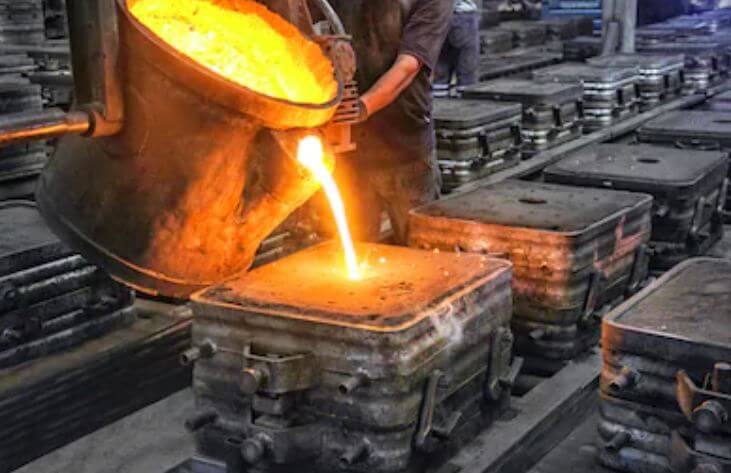What is a "Specified Skilled Worker" Residency Status about "raw materials industry" in Japan? It has been started April 2019
CONTENTS
- What is a specified skill visa (Tokuteigino visa) for "raw materials industry"?
- Problems related to specified skill for "raw materials industry"
- Human resources required for specific skills "raw materials industry"
- Criteria for acquiring the status of residence of "Specified Skills 1st"
- Examination Category and Permitted Work with This Visa
- Method of Employment for Foreign Nationals with Specified Skills "raw materials industry"
- Summary
In order to make it possible to accept foreign human resources in Japan in industries where there is a serious shortage of workers, on April 1, 2019, a new status of residence was granted: "specified skill". 14 fields such as nursing care, construction, and food service industry are designated. One of them is "raw materials industry". Demand for raw material parts is expected to increase year by year, partly due to efforts by the Ministry of Economy, Trade and Industry to improve productivity, while the number of employees is expected to fall short of labor demand. What kind of system is the specific skill "raw materials industry" established in order to improve the present state of the material industry? We will explain the current situation regarding specific skills "raw materials industry" and how to be employed.
What is a specified skill visa (Tokuteigino visa) for "raw materials industry"?
The Specified Skill (Tokuteigino Visa) for "raw materials industry" is a status of residence for foreigners who have a certain level of expertise and skills and can be immediately employed in order to respond to a serious shortage of workers in the "raw materials industry" field in Japan. The raw material industry includes machining, sheet metal, casting and forging in the machine and metal industries, and painting and welding in the construction industry. We will contribute to maintaining the sustainability of Japan's economic and social infrastructure through the continuation and development of the material industry by accepting foreign human resources who can be immediately employed.
In order to secure human resources, the industry and companies in the material industry are working to secure appropriate wage levels and to improve the workplace environment in which women and the elderly can work comfortably. The Ministry of Economy, Trade and Industry is also promoting the "manpower shortage guideline" which is a collection of good examples of SMEs that utilize diverse human resources. It is also providing tax support, such as reducing the burden of corporate tax, to enterprises that are active in raising wages. It is also making efforts to ensure proper business dealings among SMEs, such as with subcontractors.
Problems related to specified skill for "raw materials industry"

This section introduces the current status and problems of specific skills "raw materials industry".
Serious shortage of workers
In FY 2017, the difference between the number of available job offers and the number of available job seekers in the material industry was 30,000. According to national estimates, the demand for raw materials is expected to grow at about 2% per year, and if this trend continues, 62000 people will be short of workers in five years.
Even if efforts are made to secure domestic human resources as described above, and labor efficiency is improved, the amount of labor that can be supplemented after five years is only about 40,000, and it is thought that there will be a shortage of labor.
The Ministry of Economy, Trade and Industry has set the expected number of foreign workers to be accepted in the material industry at 21,500 over the next five years. Even if we consider the increasing demand in the material industry and the labor force that can be supplemented by measures to address labor shortages, including the use of specific skills systems, the overall labor force is expected to be slightly short.
Specified Skill 2nd visa is not approved for material industry
The material industry is subject to the First Specified Skills visa, but with this visa status, you can work in Japan for up to five years. With other statuses of residence, you can extend your visa indefinitely by renewing it, but with the special skill 1, they cannot work for more than five years.
On the other hand, since there is no upper limit to the length of stay for renewal of the Special Skills Number 2, it is also possible to employ foreign workers as successors for a long period in the fields covered by the system. At present, however, this visa status applies only to construction, shipbuilding and marine industries, not material industry.
Human resources required for specific skills "raw materials industry"

This section describes human resources required for specific skills "raw materials industry". If you are planning to work at a business site involved in the material industry, please be aware of the following requirements.
Criteria for acquiring the status of residence of "Specified Skills 1st"
Foreign workers who can obtain the status of residence of “Specified Skill 1st ” "raw materials industry" are limited to those who have passed the examinations provided below.
Skill test
- Manufacturing Sector-Specific Skills 1 Evaluation Test (casting)
- Manufacturing Sector-Specific Skills 1 Evaluation Test (forging)
- Manufacturing Sector-Specific Skills 1 Evaluation Test (die casting)
- Manufacturing Sector-Specific Skills 1 Evaluation Test (machining)
- Manufacturing Sector-Specific Skills 1 Evaluation Test (metal press working)
- Manufacturing Sector-Specific Skills 1 Evaluation Test (shop sheet metal)
- Manufacturing Sector-Specific Skills 1 Evaluation Test (plating)
- Manufacturing Sector-Specific Skills 1 Evaluation Test (aluminum anodizing)
- Manufacturing Sector-Specific Skills 1 Evaluation Test (Finishing)
- Manufacturing Sector-Specific Skills 1 Evaluation Test (mechanical inspection)
- Manufacturing Sector-Specific Skills 1 Evaluation Test (machine maintenance)
- Manufacturing Sector-Specific Skills 1 Evaluation Test (painting)
- Manufacturing Sector-Specific Skills 1 Evaluation Test (welding)
〇Japanese Language Proficiency Test
- Japan Foundation Japanese Language Basic Test or Japanese Language Proficiency Test (N4 or higher)
Foreign workers who have completed the Technical Intern Training (2) in the field of this sort of industry will be exempted from the above examinations.
Examination Category and Permitted Work with This Visa
Depending on the skill test passed, foreign workers can work different jobs. The test categories introduced above and their corresponding operations are as follows.
Test category | Service of job |
Casting | Melted metal into a mold to produce a product |
Forging | Strengthen and shape the forged metal by striking and pressing it |
Diecast | Press the die-cast molten metal into the mold to produce high-precision castings in large quantities in a short time |
Machining | Machining of metallic materials using various machine tools and cutting tools such as machining lathes, milling machines, and drilling machines |
Metal press work | To form a metallic material by applying a load to the metallic material by a press machine using a metal press working die and bending, forming, drawing, etc. |
Sheet metal | Process and assemble sheet metal used in various industrial products |
Plating | Coating a thin metal on the surface of a material such as a metal to prevent plating corrosion |
Aluminum anodizing | Oxidize the surface of aluminum anodized aluminum to form a film of aluminum oxide |
Finishing | Machining and adjusting parts with finishing hand tools and machine tools to increase accuracy and finish and assemble parts |
Mechanical inspection | Inspection of machine parts using various measuring instruments |
Machine maintenance | To prevent the failure and deterioration of equipment in a machine maintenance factory and to maintain and maintain normal operation of the machine. |
Painting | To cover an object to be coated with a coating film using a coating material. |
Welding | Joining members by applying welding heat or pressure or both |
Method of Employment for Foreign Nationals with Specified Skills "raw materials industry"

This article has been explaining how to employ foreigners who have acquired the status of residence of "raw materials industry".
Conditions that employers must meet
When employing foreign workers with specified skills "raw materials industry", there are standards that must also be met by the employer (accepting organization).
① Employment contracts with foreigners are appropriate (For example, the amount of remuneration is equal to or greater than that of Japanese.)
② The organization itself is appropriate (E.G., no violation of immigration or labor laws within five years).
③ There is a system to support foreigners (For example, they can provide support in a language that foreigners can understand.).
④ Appropriate plan to support foreigners (E.G., including life orientation)
Points to note regarding the employment of foreign nationals with specified skills "raw materials industry"
Employment of foreigners with specific skills "raw materials industry" is limited to direct employment only. You need to be careful because the accepting organization cannot make you work as a temp staff which makes a contract with the dispatching company.
It is also necessary to provide appropriate support to foreigners during the employment period. This support can be provided by a registered support organization (Individual or corporation).
The Special Skills Program applies not only to foreigners living overseas, but also to foreigners who have already stayed in Japan using the Technical Intern Training Program and foreign students. The labor shortage in the raw materials industry is not as severe as that in the nursing care and restaurant industries, but it is an important field for manufacturing in Japan.
Summary
So far, I have explained the current situation regarding specific skills "raw materials industry". As of the end of December 2019, the total number of foreign nationals with Skill Level 1 was 1,621, far below the expected number. Only about 193 of them are in the material industry. The system may be changed to make it easier to use in the future, but this new system is calling for a more harmonious society with foreigners.
- Categories
- Work in Japan: Japan Biz Cultural Words and 未分類
- Tags
- Japanese visa


